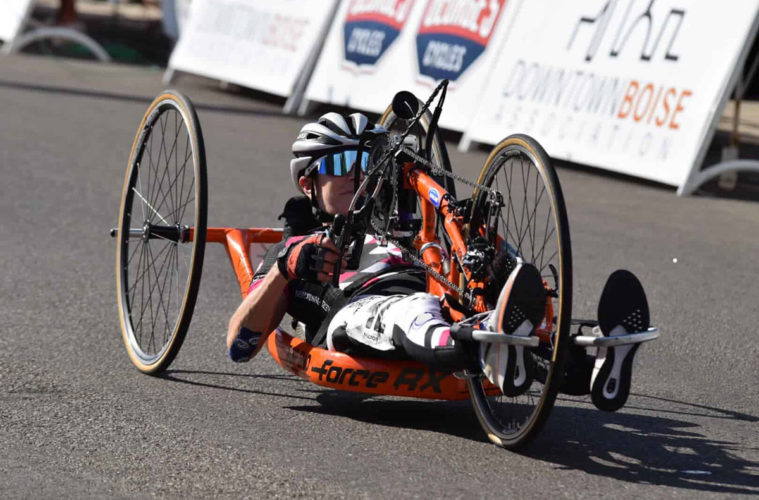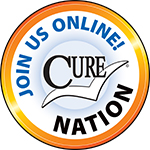 CURE NATION: What do you do four years after you’ve been hit by a car and paralyzed from the chest down? For most of us, ‘Move to Vermont and assume the leadership of a prestigious non-profit’ doesn’t top our list. Then again, most of us don’t spent our lives competing in (and winning!) marathons and cycling competitions. Nor do we spend our honeymoon biking from Oregon to New York; a 4,600-mile journey taking 58 days!
CURE NATION: What do you do four years after you’ve been hit by a car and paralyzed from the chest down? For most of us, ‘Move to Vermont and assume the leadership of a prestigious non-profit’ doesn’t top our list. Then again, most of us don’t spent our lives competing in (and winning!) marathons and cycling competitions. Nor do we spend our honeymoon biking from Oregon to New York; a 4,600-mile journey taking 58 days!
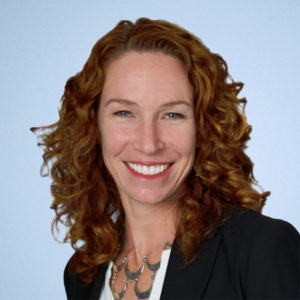
Professional portrait for Kelly Brush Foundation
Meet Edie Perkins – a woman on a unique post-injury path. After a traumatic accident, Edie ended up with seven broken vertebrae in her neck and spine. She also broke 11 of her 12 ribs and was rushed to a hospital where she stayed for 10 days before being transferred to another facility, where they knew nearly nothing about spinal cord injury.
“I must have been there for 6 weeks and they never even taught me about a bowel program.” Edie remembers with a sigh. “They told me to sit on the toilet and teach myself how to pee again. They were really trying to be nice – they were just ignorant about spinal cord injury.” It’s a familiar story to many people and it rings a bell when Edie says, “The hardest part is that you don’t know what you don’t know!”
Luckily, Edie eventually ended up at a wonderful rehab hospital, Casa Colina in Southern California.
“That was a miracle!” Edie breathes, relief evident in her voice. “They let me shower every day – instead of every two weeks –, to catheterize myself – to be independent. Still, it’s terrible to think of all the people who are still out there helpless, just because nobody insisted that they be taught!” She falls silent for a moment, choosing her words. “The world tells you that once you are broken, you will be dependent for the rest of your life. And since you don’t know what’s happening, you think maybe it really is that bad, that something about you is really wrong.”
Edie says determinedly, “That’s why you need to get yourself hooked up with others asap. You need to find out that no, there are lots of others just like you, that you are actually quite normal.”
Part of the rehab at Casa Colina consists of attending a support group run by your peers – in this case, run by the Triumph Foundation. The groups “address both practical and emotional needs of people living with SCI” and offer “candid advice and guidance from others who have faced similar circumstances”, according to the Triumph website. In the group, Edie saw people who had been living with paralysis for decades, coming to the group to share information with the newbies – some of whom attend the meeting still in their hospital gowns. Edie, with her background in education and team sports, joined Triumph as a peer-counseling Ambassador.
“I was lucky.” Edie recalls about this time in her life. “I knew right away that I wanted to compete, and I knew there was a way to do that. There were always disabled athletes in the marathons I had run, so I knew there was a place for me. I wanted to share that with others.”
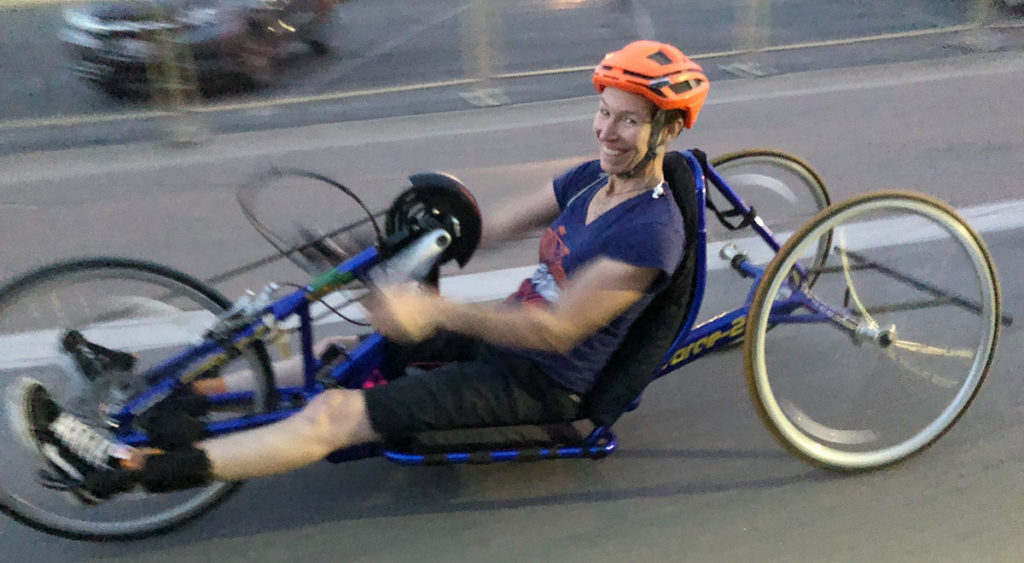
Training for her first race in Naples, FL
After being discharged from Casa Colina, Edie explains that she had a friend come live with her for a while.
“After Casa I went home and had a friend stay with me for the first 2 weeks. Of course, she went to work, so during the day I was alone.” Edie says casually, as though everyone could get out of rehab paralyzed from her chest down and be just fine alone all day. She continues her story in that same matter-of-fact tone.
“When you are in a wheelchair it is a big hassle to put on your pants, so to catheterize myself I transferred to my bed. The only problem was that carpenters were there, working on redoing my bathroom and they had politely left the room to give my privacy. Meanwhile, I’d never put on a diaper by myself, and I couldn’t get it on! I was swearing, yelling, the whole thing, I didn’t care who heard me. Finally, I hear this timid voice ask, “Are you OK?” By this time, we are both laughing at the picture of Edie flat on her back, cussing a blue streak and screaming at the top of her lungs. She continues to the main point of her story:
“I had to set aside my ego and actually ask for help. That was a big lesson.”
Edie recalls, “this poor, embarrassed carpenter trying to help me get this diaper back on, while trying not to actually look at me!”
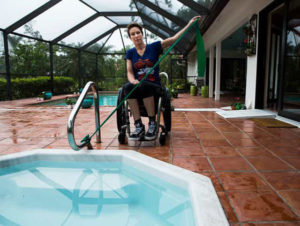
Doing daily shoulder exercises
It was this spirit, as well as her experience in sports and competition, that brought Edie to the attention of the Kelly Brush Foundation. In 2006 Kelly Brush, a competitive skier and all-around athlete, crashed into a tower on the competition’s ski slope and became paralyzed at the T-7 level. In an interview with ESPN, Kelly says, “Being able to still do sports made such a huge difference in my recovery. I woke up the next day and wanted to ski. Sports gives me a way to fight, but a lot of people don’t have that opportunity because things are so expensive.” She created the Kelly Brush Foundation, offering programs to both bring people together and assist them in paying for the equipment they need to participate.
Meanwhile, Edie was looking for her own dream job.
“For years I wanted to combine my background in business with my passion for sports. After the accident when I began to think about the big picture, I really wanted to combine business, sports and working with people with disabilities in some variation. I volunteered at Challenged Athletes Foundation, which appeared to be my dream job, but I couldn’t seem to get in the door.
“When I got the job description for Kelly Brush Executive Director, my jaw dropped.” Edie says, still sounding amazed. “The Kelly Brush Foundation only had 5 employees at the time they were considering me for the job, so I thought I can do this, I’ve managed businesses bigger than this! It was nerve-wracking, though. They had a rigorous application process, it was a full 3 months before I knew I’d been accepted, before I became the Kelly Brush Foundation’s Executive Director.
Edie reflects on the saying some veterans of spinal cord injury taught her ‘when you go home, that’s when your rehab really begins’.
“The first week home I had regular melt downs every couple of hours, but after the first week it was better. I was so proud when I’d accomplish something new. The first time I rolled down to Traders Joe’s by myself, I felt like I’d completed a marathon!”
One of the hardest parts of being home, as Edie experienced it, was the need for new routines. “When I got home from the hospitals I was really confused about catheterizing. At first, I would set an alarm every morning at 2am to catheterize myself. It’s a good thing I was sleeping alone – I’d be up in the middle of the night yelling, “Argh, I can’t find the hole!” Finally, I learned this catheterizing hack: I cut a little slash in my pants, big enough to just stretch it open. NO more getting pants up and down!” With her busy life that makes sense, as does her choice of catheter.
What Edie Thinks About Cure Medical
“I’m always running around, so those little catheters – the CURE Ultra – they are perfect for me. They are so compact, I can take them with me, no problem. And when I learned that Cure supports medical research, I was really impressed. I just love that they do that, it’s a great thing!”
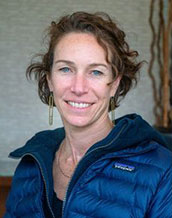
Triumph Foundation Ambassador
Eventually Edie was able to relax the rigid scheduling and sleep through the night. From her current perspective looking back she says, “Now that I have had a few years to get used to this, I think the most important part of the journey is to find peers who are going through the same thing.
You’ve got to celebrate,” Edie pauses between her words for emphasis, “Every. Little. Thing.
Because eventually there will be a time that your body is going to crap out on you; UTIs, nerve pain, spasticity. You have to be prepared to deal with all of that and never give up.”
Author’s Note: Edie’s story includes being forced to fight her HMO for medical care; gathering a successful support system of friends and raising $220,000 on a Go Fund Me page – all indicative of her independent and doggedly persistent personality. Some resources she suggests include:
www.triumph-foundation.org
www.kellybrushfoundation.org
www.challengedathletes.org
www.curemedical.com
You may also enjoy:

